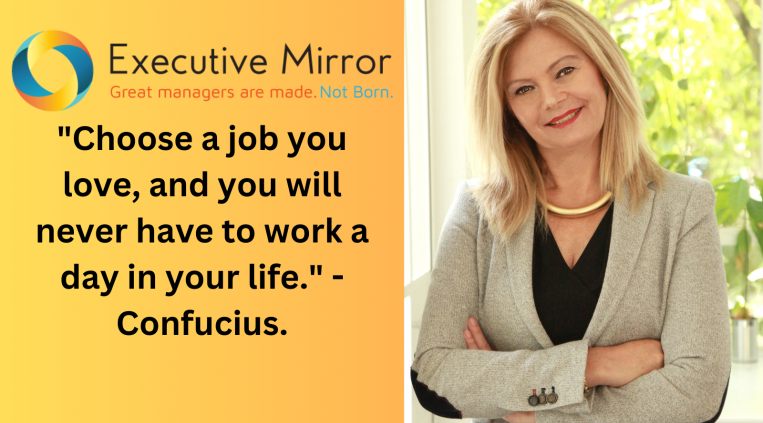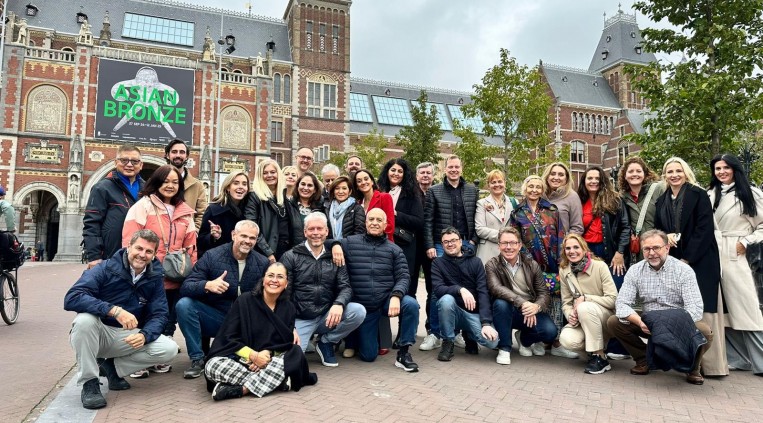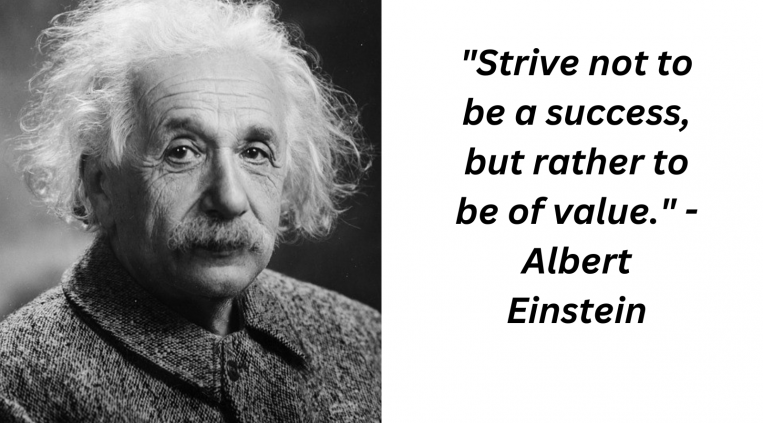
How do you Identify Those Who Love Their Work?

Confucius' timeless adage, "Choose a job you love, and you will never have to work a day in your life," encapsulates the ideal of finding fulfillment in one's career. But how can we identify individuals who have truly found their passion in their work?
People who love their jobs often exhibit certain characteristics:
Intrinsic Motivation: They're driven by internal rewards, such as a sense of accomplishment or personal growth, rather than solely by external factors like money or recognition.
Passion and Enthusiasm: Their eyes light up when they talk about their work, and they often go above and beyond what is expected of them.
A Growth Mindset: They embrace challenges as opportunities to learn and improve, and they are constantly seeking new ways to develop their skills.
Resilience: They can bounce back from setbacks and failures, viewing them as valuable learning experiences.
Alignment with Values: Their work aligns with their personal values and beliefs, giving them a sense of purpose.
get your weekly free blog update
"It is amazing what you can accomplish if you do not care who gets the credit, - Harry S.

"Great leaders don’t set out to be leaders, they set out to make a difference. It’s never about the role—always about the goal. And the best way to reach that goal is by harnessing the collective wisdom of many." This perfectly captures the mindset that leaders bring to global meetings.
In an international setting, where diverse leaders unite with a shared purpose, the emphasis isn’t on titles or individual accolades but on making a lasting impact. The true essence of leadership lies in creating meaningful change, and the most powerful way to achieve that is through collective wisdom. Each leader brings a unique perspective, shaped by their own culture, experience, and challenges, enriching the discussions and strategies. When leaders work together toward a common goal, setting aside personal recognition, they can drive far-reaching solutions to the world's most pressing problems.
This spirit of collaboration, where everyone is committed to a larger purpose, is what transforms leadership from a role to a mission. At international meetings like these, the focus on unity and shared vision leads to extraordinary accomplishments that would be impossible in isolation. It’s not about who gets credit—it's about harnessing the collective strength of many to make a real difference.
"The Power of Global Leadership: One Vision, Many Voices"
get your weekly free blog update
COMMENTS
The Power of Thought

"Watch your thoughts; they become words. Watch your words; they become actions. Watch your actions; they become habits. Watch your habits; they become character. Watch your character; it becomes your destiny."
- Swami Sivananda
This powerful quote by Swami Sivananda outlines a clear chain of cause and effect, emphasizing the interconnectedness of our thoughts, words, actions, habits, character, and ultimately, our destiny. Let's break down each element of the quote:
1. Thoughts: The Seeds of Creation
The starting point: Our thoughts are the seeds from which our actions and ultimately our lives grow.
Positive vs. negative thoughts: Consciously cultivating positive thoughts can lead to positive outcomes.
The power of affirmations: Repeating positive affirmations can reprogram our minds and shape our thoughts.
2. Words: The Manifestation of Thoughts
The spoken word: Our words are the external manifestation of our thoughts.
The Law of Attraction: The principle that what we think and say attracts corresponding experiences into our lives.
Watch your language: Be mindful of the words you use, as they can influence your actions and beliefs.
3. Actions: The Reflection of Thoughts and Words
Habits are formed through actions: Repeated actions over time solidify into habits.
The importance of intention: Acting with intention and purpose can lead to more positive outcomes.
The power of choice: We have the power to choose our actions and shape our destiny.
4. Habits: The Building Blocks of Character
Character is formed through habits: Our habits define who we are and how we interact with the world.
Breaking bad habits: Recognizing and addressing harmful habits is essential for personal growth.
Cultivating good habits: Developing positive habits can lead to significant improvements in our lives.
5. Character: The Determinant of Destiny
Character is destiny: Our character, shaped by our habits, ultimately determines the course of our lives.
The importance of self-awareness: Understanding our character is crucial for personal growth and fulfillment.
The power of change: While character may seem fixed, it is possible to change it through conscious effort.
In essence, this quote emphasizes the interconnectedness of our thoughts, words, actions, habits, character, and destiny. It serves as a powerful reminder that by cultivating positive thoughts and habits, we can shape our lives in a way that aligns with our highest aspirations.
get your weekly free blog update
COMMENTS
"Strive not to be a success, but rather to be of value." - Albert Einstein

True leadership is not about chasing accolades or seeking recognition; it's about making a positive impact and leaving a lasting legacy. A leader who strives to be of value focuses on empowering others, fostering growth, and creating a positive environment where individuals can thrive. Their success is measured not by their own personal achievements but by the collective accomplishments of those they lead.
Effective leaders understand that their worth lies in their ability to add value to others. They recognize that their role is not to dictate or control but to guide, inspire, and support. They are committed to serving their team members, customers, and the broader community, and they seek opportunities to make a meaningful difference in the world.
Albert Einstein's quote reminds us that true success is not about external validation or achieving recognition; it's about making a meaningful contribution to the world. Leaders who embody this principle are the ones who leave a lasting legacy and inspire others to reach their full potential.
And always remember:
Great managers are made. Not born.
get your weekly free blog update
COMMENTS
Dream it, Achieve it : Unlock Your Full Potential!

Have you ever felt like you're just scratching the surface of your potential? Well, you're not alone. Today, I'm excited to talk about how you can unleash that untapped power within you. So, let's dive right in! First off, let's talk about self-belief. Believe it or not, the first step to unleashing your inner power is believing that you have it. … Yes, it sounds simple, but it's not always easy. Every day, tell yourself, I have the power to achieve my dreams. This isn't just feel-good advice; it's about setting the foundation for your success……… Next up, goals. But not just any goals—specific, measurable, achievable, relevant, and time-bound goals, or SMART goals. Write them down, make a plan, and stick to it. It’s like plotting your personal roadmap to success. When you know where you're heading, that inner power starts to come alive. Now, let's talk about resilience. The road to unleashing your potential is definitely not free of obstacles. But guess what? Every challenge is an opportunity to grow stronger. When you stumble, make it part of your dance. Keep pushing forward, because resilience is a mighty component of your inner power. And, don't forget about reflection. Take time to reflect on your progress. What have you learned? What can you improve? Reflection is your secret weapon. It allows you to pause, assess, and gear up to leap even higher. Lastly, surround yourself with positivity. Connect with people who lift you up and inspire you to be your best self. Their energy will fuel your journey and amplify your inner strength. Remember, unleashing your inner power is a continuous journey. It's about taking small, consistent steps towards your dreams. And I believe in you. You've got so much to offer, so much potential just waiting to be set free. So go ahead, take that first step today, and let's make your dreams a reality. Thanks for tuning in, and remember, you have the power to change your life. Start today, and never look back. You've got this!
get your weekly free blog update
COMMENTS
Unlock Your Promotion Potential: How to Be Seen as Leadership Material

In today's competitive world, it's more important than ever to have a strong personal brand. Your personal brand is your reputation, your image, and the way you are perceived by others. It's what sets you apart from the crowd and helps you achieve your goals.
But how do you create a strong personal brand? How do you make others see you in the way you want them to?
The answer lies in image crafting.
Image crafting is the process of deliberately creating the image you want others to have of you. It's about being mindful of your thoughts, words, and actions, and ensuring that they are all aligned with your desired brand image.
Here are a few tips for crafting your personal brand:
1. Define your brand.
What do you want to be known for? What are your values? What are your goals? Once you know what you want to stand for, you can start to create an image that reflects that.
2. Be consistent.
Your brand image should be consistent across all platforms, from your social media profiles to your website to your interactions with others.
3. Be authentic.
Don't try to be someone you're not. People will see through that. Instead, be true to yourself and let your personality shine through.
4. Be visible.
Get out there and let people see you! Attend industry events, network with others, and share your expertise online.
5. Be proactive.
Don't wait for others to define your brand. Take control of your narrative and create the image you want them to see.
And always remember:
Great managers are made. Not born.
get your weekly free blog update
COMMENTS
Leadership for Everyone: Embracing Challenges, Learning from Mistakes, and Growing as a Leader

Do Introverts Make Bad Leaders? The Answer May Surprise You!Leadership is a constantly evolving field, and while some characteristics may seem essential, the truth is even introverts can excel in leadership roles. The key lies in unlocking untapped potential, a belief that's core to my coaching philosophy.
Leadership isn't a fixed box of traits, but a dynamic journey. It requires continuous learning, self-reflection, and growth. Forget one-size-fits-all models! Successful leaders identify their strengths and weaknesses, actively developing their skills and overcoming limitations.
Leadership potential resides within everyone, regardless of background or experience.
It's about embracing challenges, learning from setbacks, and stepping outside your comfort zone. Remember, even the most effective leaders weren't born perfect. They honed their skills through continuous learning and self-improvement.
Effective leadership isn't just a set of skills; it's about adaptability, communication, and inspiring others towards a common goal. These qualities can be nurtured over time. The best leaders never stop learning, seeking opportunities for growth.
In conclusion, leadership isn't about mimicking models or working harder; it's about recognizing and developing your unique potential. Embrace challenges, learn from mistakes, and focus on continuous self-improvement. By doing so, you'll unlock your leadership potential and achieve greater success.
And always remember:
Great managers are made. Not born.
get your weekly free blog update
COMMENTS
"The Blindspot Effect: How Arrogance Shapes Leadership Decisions"

Arrogance: it's a leadership weakness disguised as strength. Studies show of leaders struggle with overconfidence. This can be disastrous, leading to poor decisions with far-reaching consequences.
How Arrogance Clouds Judgment
Arrogance distorts leaders' perception of reality. They become overly confident in their abilities, leading to:
-
Misinterpreting information: They may ignore data or feedback that contradicts their preconceived notions.
-
Overreliance on past experience: They may believe they've "seen it all" and dismiss new ideas or approaches.
-
Inability to admit mistakes: Arrogant leaders may be defensive and unwilling to acknowledge when they're wrong.
The Danger of Relying on "Superpowers"
Arrogant leaders often believe they possess superpowers that allow them to quickly understand and handle any situation. This can lead to:
-
Impulsive decision-making: They may rush to judgment without fully considering all the options.
-
Ignoring expert advice: They may believe they know better than others, even those with more experience or expertise.
-
Taking unnecessary risks: They may overestimate their abilities and underestimate the potential consequences of their actions.
How to Overcome Arrogance
The good news is that arrogance can be managed. Here are three steps leaders can take:
1. Educate Yourself:
Understand the signs of arrogance and how it can impact decision-making. Read books, articles, or attend workshops on leadership development.
2. Seek Honest Feedback:
Surround yourself with trusted advisors who can offer constructive criticism. Ask for regular feedback from your team members, peers, and supervisors.
3. Embrace Continuous Learning:
Never stop learning and growing as a leader. Stay curious and open to new ideas. Attend conferences, take online courses, or read books on a variety of topics.
By taking these steps, leaders can overcome arrogance and make better decisions for themselves and their organizations.
Looking Ahead:
In the next post, we'll delve deeper into identifying the symptoms of arrogance so you can learn to manage them and become a more effective leader.
And always remember:
Great managers are made. Not born.
get your weekly free blog update
COMMENTS
"AI-Allyship: Revolutionizing Leadership Coaching through Human-Tech Synergy"

The world of leadership coaching is undergoing a significant transformation with the rapid development of artificial intelligence (AI). These technologies open up new possibilities and challenge traditional approaches, raising questions about the future of leadership coaching.
Will AI replace human coaches? The answer is a clear no! AI will not replace coaches but will become a strategic partner in the coaching process. Collaboration between AI and human coaching will lead to the creation of more efficient, personalized, and advanced coaching processes, enabling leaders to achieve higher results.
Here are some advantages of collaboration between AI and human coaching:
1. Data and information analysis: AI will allow coaches to analyze massive amounts of data, such as employee feedback, surveys, and performance metrics, to gain a broader and more comprehensive picture of leaders' strengths and weaknesses.
2. Personalized coaching plans: AI will help coaches build personalized coaching plans for each leader, considering their unique needs, goals, and learning style.
3. Providing on-demand advice: AI-powered chatbots will be available 24/7 to provide leaders with support, guidance, and answers to ongoing questions.
4. Developing new skills: AI can help coaches develop new skills such as data analysis, machine learning, and interpersonal communication.
5. Improved coaching outcomes: Collaboration between AI and human coaching will significantly improve coaching outcomes and lead to the achievement of business and personal goals.
In conclusion, collaboration between AI and human coaching is the key to the future of leadership coaching. AI will not replace coaches but will become a complementary and essential tool that will allow them to focus on what really matters, such as building meaningful relationships with leaders and developing self-awareness.
The future of leadership coaching belongs to those who can combine the benefits of AI with our unique human capabilities. Together, we can create a new world of coaching, more efficient, personalized, and meaningful.
Join me on this journey! Let's discuss together the challenges and opportunities presented by the AI age and learn how to become powerful and leading leadership coaches in the new world.
The future is ours to shape!
And always remember:
Great managers are made. Not born.
get your weekly free blog update
COMMENTS
Leadership in the Age of AI: Human Challenge or Historic Opportunity?

The world is evolving at a rapid pace, and technology is impacting every aspect of our lives, including the business world. Artificial Intelligence (AI) is breaking new ground and opening up new possibilities for leadership development.
How AI will impact future leaders:
-
Deep Data Understanding: Future leaders will be skilled in data and the ability to analyze it effectively. AI will provide them with advanced tools for forecasting trends, identifying opportunities, and making informed decisions.
-
High Emotional Intelligence: Future leaders will have high self-awareness and the ability to understand and communicate effectively with their own and others' emotions. AI will assist them in developing these skills through feedback and insights.
-
Creativity and Innovative Thinking: AI will not replace the human ability to think creatively and solve problems in innovative ways. Future leaders will be those who know how to use AI as a tool for inspiration and creativity.
-
Continuous Learning Ability: The business world is constantly changing, and leaders need to be able to learn and adapt quickly. AI will provide them with access to information and resources that will help them stay up-to-date and develop their skills.
Advantages of Leadership Development using AI:
-
Personalization: AI can tailor leadership development programs to the individual needs of each leader.
-
Experiential Learning: AI can make the learning process more engaging and enjoyable, which can lead to significantly improved engagement and retention rates.
-
Accessibility: AI is available 24/7, allowing leaders to learn anytime, anywhere.
-
Cost Savings: Leadership development using AI can be more efficient and cost-effective than traditional methods.
Challenges of Leadership Development using AI:
-
Data Reliability: The quality of AI-based leadership development programs depends on the quality of the data used to train the models.
-
Algorithmic Bias: It is important to ensure that AI models are unbiased and do not discriminate for or against certain groups of leaders.
-
Human Resistance: Some leaders may resist the use of AI for leadership development.
-
Loss of Human Control: It is important to ensure that leaders maintain control over their leadership development process and do not rely solely on AI.
New Opportunities:
-
Global Leadership Development: AI can enable leaders to learn and develop their skills from anywhere in the world.
-
Creating Learning Communities: AI can help create virtual learning communities for leaders, where they can share knowledge, experiences, and ideas.
-
Developing Integrative Leadership: AI can assist leaders in developing integrative skills, such as systems thinking, collaboration, and cross-functional decision-making.
The Future of Leadership Development:
AI will become an essential tool for leadership development in the future. Leaders who know how to use AI effectively will be the ones who lead their organizations to success.
And always remember:
Great managers are made. Not born.
get your weekly free blog update
COMMENTS
Pages

Get my FREE ebook and never get turned down again !
Popular posts
-
Today, there doesn’t seem to be any aspect of our lives that isn’t...
-
When I welcomed Mark, the CEO of a very successful hi-tech company...
-
Ironically, many C-levels don’t even consider working with...
-
“What’s bothering you, Marlene?”
As I watched...
-
For those of you...
-
What seems to be the dream of every number two in an organization...
-
I believe that coaches can help leaders with an ego by focusing on...
-
I’ve said it before. There’s a chronic illness plaguing our...













COMMENTS